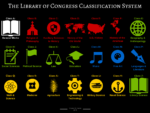Tuesday is our usual Homeschool Books & Libraries Day in the River Houses, and on the first Tuesday of each month we invite you and your students to explore one of the major Dewey Decimal classes at your local library. If you start at the beginning of the River Houses year in September and run until July, you can adopt one major class each month and survey the whole of knowledge (!) in a year.
The class for February is the 400s, which covers Language. (The Dewey system is grouped into hundreds, so “the 400s” means the numbers running from 400 to 499.)
![[Dewey Decimal Classes]](https://riverhouses.org/wp-content/uploads/2018/09/dewey-decimal-classes.jpg)
Here’s what you’ll find at your local library in the Linguistic 400s:
- CLASS 400 – LANGUAGE
-
- 400 – Language (General)
- 410 – Linguistics
- 420 – English and Old English Languages
- 430 – German and Related Languages
- 440 – French and Related Languages
- 450 – Italian, Romanian, and Related Languages
- 460 – Spanish, Portuguese, and Galician
- 470 – Latin and Italic Languages
- 480 – Classical and Modern Greek Languages
- 490 – Other Languages
Each of these “tens” divisions is subdivided further of course. For example, in the 410s (Linguistics) you’ll find works on Writing Systems (411), Phonology (414), Dialectology (417), and so on.
When you’re learning the library with your students, be sure they understand that any library collection that uses the Dewey Decimal Classification will be arranged in the same way: the numbers run from 000 to 999 in every Dewey-based library, so if you’re interested in, for example, the Italian language, you’ll find it in the 450s in both the small-town library near you and in the big-city library across the country. If you have an opportunity to take field trips to multiple libraries over the course of the year you’ll be able to demonstrate that in practice and get your students accustomed to orienting themselves by reading the numbers aloud as you walk together down the ranges: “400 … 420 … 440 … here it is, 450.”
Mastering these library basics will help your students become independent life-long learners and will ensure that they’ll feel right at home in any library they visit.
What delightful decimals and textual treasures have you and your students discovered in your library this Orion Term? 😊
❡ Make it a tradition: Why not spend a few minutes during your first library visit each month and devise a little Dewey tradition of your own. Read the title page of one book in the 400s, one in the 410s, one in the 420s, one in the 430s, and so on. Find the very first book in the class (the lowest 400) and the very last book in the class (the highest 499). Find the thinnest book and the thickest book in each class. Make a list of your three favorite numbers in each class. If you follow a simple pattern like this month-by-month, over the course of the year you’ll be surprised how much information your students will absorb and how many academic skills they will develop without even realizing it. 📚
❡ Looking in the lexicon: The Dewey system attempts to encompass the whole of knowledge, so there’s a good chance it will introduce your students to subjects and terminology they haven’t encountered before. In the 400s, for example, they may come across words like “Etymology,” “Phonology,” “Semantics,” and “Transliteration” (to name just a few). During or after your library visit, then, why not send your students to your family dictionary or to any dictionary sitting open in the library reference room and invite them to investigate some distinguished Dewey-inspired vocabulary. 📖
❡ Dukedoms large enough: Have you found all the local libraries in your area? There may be more than you realize, and there’s no better homeschool field trip than a field trip to a new library! The WorldCat Library Finder will help you find all the library collections near you — public and private, large and small — and the WorldCat catalog itself will help you locate the closest copy of almost any book in the world. 🏛
❡ Dewey Detectives at home: Did you know there are secret Dewey Decimal numbers hiding in the books on your very own shelves? It’s true! Here are some tips on how you can send your students on a treasure hunt to find them. 🔍️
❡ Books in the running brooks: The sidebar on the River Houses website has links to several wonderful online library collections that we like to explore. Why not sit yourself down at a large screen for a while (rather than a phone) and give them a browse. 🖥
❡ When in doubt, go to the library: This is one of our regular Homeschool Books & Libraries posts. Add your name to our weekly mailing list and get great homeschool teaching ideas delivered right to your mailbox all through the year. 📫
❡ Homeschool calendars: We have a whole collection of free, printable, educational homeschool calendars and planners available on our main River Houses calendar page. They will help you create a light and easy structure for your homeschool year. Give them a try today! 🗓
❡ Support our work: If you enjoy our educational materials, please support us by starting your regular Amazon shopping from our very own homeschool teaching supplies page. When you click through from our page, any purchase you make earns us a small commission at no extra cost to you. Thank you for helping us to keep going and growing! 🛒
❡ Join us! The aim of the River Houses project is to create a network of friendly local homeschool support groups — local chapters that we call “Houses.” Our first at-large chapter, Headwaters House, is now forming and is open to homeschoolers everywhere. Find out how to become one of our founding members on the Headwaters House membership page. 🏡



